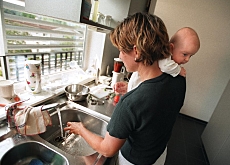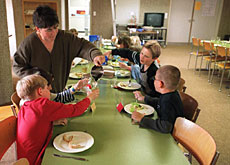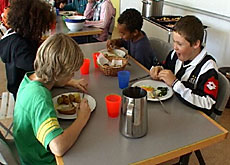After-school care is a tale of two cities

As experts debate whether after-school care should be the norm throughout Switzerland, Bern has pressed ahead with its own provision.
It offers out-of-hours care in nearly every school district and plans to roll out more over the next year.
Day schools in many European countries commonly conjure up images of nine-to-four days for children, where they are fed, watered and educated.
Not so in Switzerland, where the norm is closer to being in school for half a day at a time, depending on your canton.
For parents, such a timetable requires careful planning and much juggling, especially as some schools don’t even offer lunch.
Two-thirds of mothers of children up to age six are in employment, and a third of all households with kids under the age of 15 use some kind of day care.
Some mothers, though, decide not to go through the rigmarole of organising childminders, relatives or friends to pick their children up from school in the middle of the day – and simply put their careers on the backburner.
Positive moves
This autumn a cross-party alliance of female politicians called for day schools to become the norm across Switzerland. The government responded that moves were already underway to realise this.
This can be seen clearly in Bern; thanks to a local policy shift a number of years ago, aftercare provision is on offer in nearly every school district.
“After-school care is a must if you take the equality of women even a little bit seriously,” says Urs Fritschi, the head of Manuel School’s day school in Bern’s Elfenau quarter.
Many of the 80-odd children who take advantage of the services provided at this school come from single-parent families, headed by mothers who have to earn a living.
All parents contribute towards the costs of care – the price for two hours varies from SFr1 ($0.76) to SFr22 and is means-tested.
The majority of parents pay the middle tariff but these contributions do not cover the entire costs – the city also provides a not insubstantial subsidy. But it’s worth every penny of public money, says Fritschi.
“It is money wisely invested. These kids would otherwise be alone at home or on the streets, with not enough to eat, no supervision and no help with their homework,” he said.
This kind of institution can help children from non-Swiss backgrounds integrate better into society, he believes.
“We have a lot of foreign children here and kids learn to speak a language best when they talk to other kids – that’s invaluable,” said Fritschi.
Big help
Saska Schroeder is one working mother who benefits; she has two children aged four and seven.
“For me it is great relief to be able to use after-school care. I can completely dedicate myself to my profession during the hours when my children are being cared for,” Schroeder told swissinfo.
The road to childcare for this lawyer was littered with difficulties. First she had problems finding someone to care for her children.
Another hurdle was trying to find part-time work while her children were still young.
“It’s difficult to get a part-time job – you have to jump through hoops to work as a woman,” she said.
So why isn’t it easier for women to go back to work once their children have reached school age?
Fritschi told swissinfo the reason why day schools were not the norm in Switzerland was historical as there was an entrenched tradition of keeping children at home with mother for as long as possible.
Schroeder would agree.
“It’s an old tradition in Switzerland to keep childcare in the family. Every woman has to look out for herself – there is very little solidarity among women in this respect,” she said.
Struggle
This is something that Monika Lanz learnt the hard way in the town of Spiez, half an hour away from the Swiss capital.
Lanz faced an uphill struggle to set up a lunch service for children in the area, whose schools did not provide them with a midday meal.
She knew that there were many parents who wanted their kids to be looked after while they were at work, but that the current schooling system did not cater to those needs.
She conducted a survey at one school in town – between 20-30 children would benefit from the service she was proposing.
What left her especially angry was that her position as a local councillor did not help much; she felt that support from the council was lacking.
“I’m a member of the council’s school commission and the most helpful advice they offered was that I should set up the service as a private person,” she said.
Worst enemies
According to Lanz, opposition was strongest among mothers who stayed at home. The prevailing attitude was that their school-going children should not eat lunch outside home.
But, despite the problems, the lunch service finally started up at the beginning of November and has proved popular.
Fifteen children regularly attend on Tuesdays, the one day a week the service is offered. Another 14 children attend on an ad-hoc basis.
swissinfo, Faryal Mirza
A widespread problem across German-speaking Switzerland is the lack of so-called “Blockzeiten” or fixed hours, which means that the duration of a school day varies from school to school, from canton to canton and from child to child.
For example, some children may only attend school two mornings and one afternoon a week and some schools do not offer lunch.

In compliance with the JTI standards
More: SWI swissinfo.ch certified by the Journalism Trust Initiative



You can find an overview of ongoing debates with our journalists here. Please join us!
If you want to start a conversation about a topic raised in this article or want to report factual errors, email us at english@swissinfo.ch.